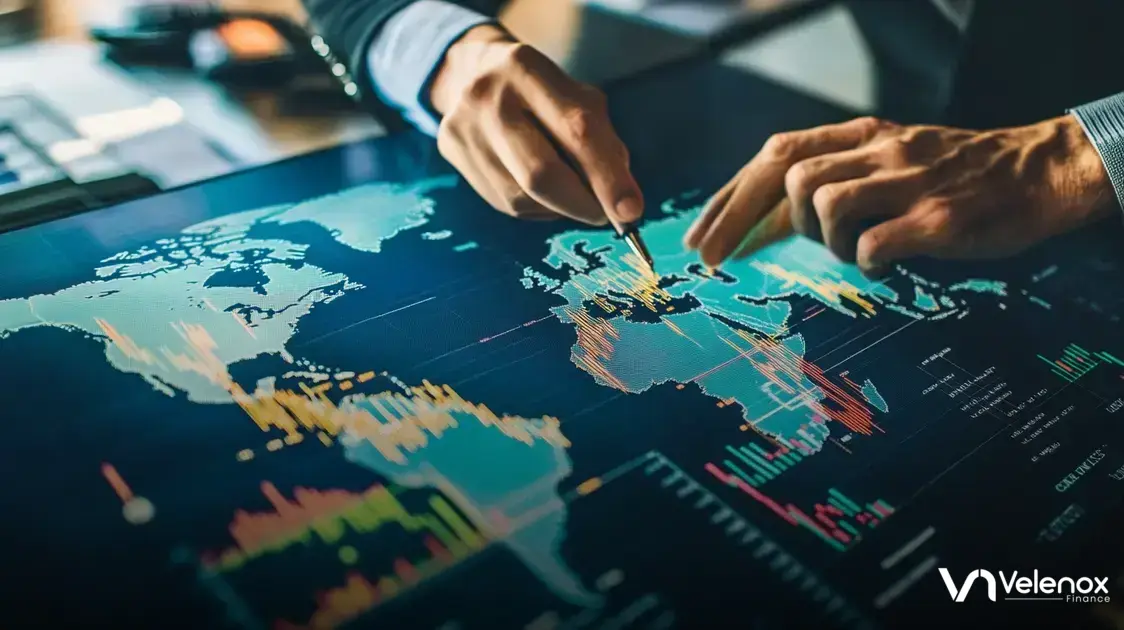Global investments involve allocating capital to international markets, offering diversification, access to emerging opportunities, and exposure to various sectors.
Investors should educate themselves, define goals, and be aware of risks to successfully navigate global investment landscapes.
Global investments are essential for anyone looking to diversify their portfolio and tap into international markets.
By exploring global investments, investors can access numerous opportunities that go beyond their local market.
Understanding Global Investments
Understanding Global Investments is crucial for any investor looking to navigate the complexities of international markets.
Global investments involve allocating capital to assets outside of one’s home country.
This strategy allows investors to access a diverse range of opportunities, improving their overall portfolio performance.
What Are Global Investments?
Global investments cover various asset classes, including stocks, bonds, real estate, and commodities from different nations.
By investing globally, you gain exposure to economic growth in emerging markets and also benefit from established markets’ stability.
This diversification helps mitigate risks associated with being too focused on a single market.
Why Invest Globally?
Investing outside your home country can enhance returns by tapping into sectors that may not be thriving locally.
Global investments can protect against local market downturns, allowing your portfolio to remain resilient.
Additionally, you may find unique investment opportunities in industries that are developing rapidly in other parts of the world.
How to Assess Global Investments
When considering global investments, it’s essential to evaluate several factors.
Look at the economic environment, political stability, and currency fluctuations in the countries you are interested in.
Understanding these elements helps in making informed investment decisions and minimizing risks.
Key Metrics to Monitor
Investors should pay attention to key performance indicators like GDP growth, inflation rates, and foreign direct investment levels of the countries involved.
Additionally, analyzing trade balances and employment figures gives insight into the economic health of a nation, guiding investment choices.
Investment Vehicles for Global Investments
Several vehicles are available for global investments, including exchange-traded funds (ETFs), mutual funds, and direct stock purchases of international companies.
ETFs are particularly popular, as they provide exposure to various markets with lower fees and greater flexibility.
Challenges in Global Investments
Although rewarding, global investments come with challenges. Investors face political risk, currency risk, and lack of transparency in some markets.
To navigate these challenges, thorough research and a diversified approach can mitigate potential downsides.
Getting Started with Global Investments
Starting your global investment journey can seem daunting, but taking it step by step helps.
Begin by educating yourself about different markets and asset classes.
Consider working with a financial advisor who specializes in global investments to develop a strategy tailored to your goals.
Benefits of Global Investments
Benefits of Global Investments are numerous and can significantly enhance your investment portfolio.
By diversifying into international markets, you can tap into a variety of opportunities that might not be available domestically.
Diversification
One of the biggest benefits of global investments is diversification.
Investing globally allows you to spread your risk across different countries and sectors.
This reduces the impact of local market downturns on your overall portfolio.
Access to Growth Markets
Many emerging markets have higher growth potential compared to developed countries.
By investing in these regions, you position yourself to benefit from rapid economic growth, expanding middle-class populations, and increased consumer spending.
Currency Hedging
Global investments can act as a hedge against currency fluctuations.
By holding assets in different currencies, you can protect your investments from losing value due to a weakening of your home currency.
Opportunities in Various Sectors
Global investments provide access to industries that may not be as developed in your home market.
This includes tech startups in Asia, renewable energy projects in Europe, and real estate in booming cities around the world.
Better Returns
Investing globally can lead to higher returns over time.
While domestic investments can be profitable, some international markets offer returns that are often more attractive, especially during periods of economic growth.
Enhanced Portfolio Stability
Having a mix of global assets can enhance the overall stability of your portfolio.
Different markets often respond differently to economic events, which can help balance out volatility.
Investing in Global Trends
Global investments allow you to capitalize on major trends affecting multiple economies.
This includes healthcare advancements, technology adoption, and sustainability efforts.
By aligning your investments with these trends, you increase the likelihood of success.
Network and Knowledge Expansion
Being involved in global markets helps broaden your knowledge and networking opportunities.
It exposes you to different cultures and business practices, enhancing your overall investment acumen.
Strategies for Diversifying Globally

Strategies for Diversifying Globally are essential for investors looking to maximize returns and reduce risks.
By diversifying investments across various markets, you can create a more resilient portfolio that withstands fluctuations.
Understand Global Markets
Begin by researching different global markets. Look into regions that are performing well economically and identify industries that show strong growth potential.
Understanding economic indicators will guide your investment decisions.
Invest in International Funds
One effective strategy is to invest in international mutual funds or exchange-traded funds (ETFs).
These funds pool capital from multiple investors to purchase a diversified selection of global assets.
This approach provides exposure to various markets without requiring investors to pick individual stocks.
Consider Emerging Markets
Emerging markets often offer greater growth opportunities compared to developed countries.
By including various emerging economies in your portfolio, you can benefit from rapid economic advancements and increasing consumer demand.
Asset Allocation
Wise asset allocation is crucial for global diversification.
Determine how much of your portfolio should be allocated to foreign investments based on your risk tolerance and investment goals.
A well-balanced allocation may include stocks, bonds, and real estate across different countries.
Use Currency Diversification
Diversifying across different currencies can also reduce risk.
When investing globally, holding assets in various currencies helps to mitigate the negative effects of currency fluctuations.
Consider using foreign exchange accounts or investing in assets priced in different currencies.
Invest in Global Infrastructure
Global infrastructure investments, such as energy, transport, and utilities, provide opportunities that benefit from worldwide trends.
This sector is often less volatile and provides steady income through dividends and cash flows.
Stay Informed
Regularly monitor global economic news and market developments.
Understanding geopolitical events, policy changes, and economic indicators can help you make timely adjustments to your global investment strategy.
Consult with Experts
Engaging with financial advisors who specialize in global investments can provide valuable insights and tailored strategies.
Their expertise can help you navigate complex international markets and make informed decisions.
Top Markets for Global Investments
Identifying the top markets for global investments is essential for diversifying your portfolio and optimizing returns.
Each market offers unique opportunities that can enhance your investment strategy.
United States
The US remains a leading destination for global investments due to its large economy and diverse market.
With robust technology, finance, and healthcare sectors, investors can find numerous opportunities across various industries.
China
As the world’s second-largest economy, China presents substantial growth potential.
Rapid urbanization and a growing middle class contribute to rising consumer demand.
Sectors like technology, e-commerce, and renewable energy are particularly attractive for investors.
India
India is an emerging market with a booming population and a young workforce.
With strong economic growth and government initiatives promoting digitalization, Indian markets present attractive investment opportunities.
Sectors like technology and infrastructure, in particular, have the potential to yield significant returns.
Germany
Germany leads Europe in terms of economic strength and stability.
Known for its engineering and automotive industries, this market attracts investors seeking to benefit from high-quality manufacturing and innovation.
Brazil
As the largest economy in South America, Brazil offers various investment opportunities, particularly in agriculture, energy, and natural resources.
The country’s increasing focus on sustainability and renewables is also a growing sector for potential investments.
Singapore
Singapore serves as a financial hub in Asia, attracting investors with its transparent regulations and business-friendly environment.
The city-state is ideal for investments in finance, logistics, and technology.
United Kingdom
The UK remains a key global market, offering diverse investment opportunities across various sectors, including finance, technology, and healthcare.
Its strong legal system and established infrastructure make it an attractive destination for foreign investment.
Australia
Australia’s stable economy and rich natural resources make it a desirable market for global investors.
Key sectors include mining, agriculture, and renewable energy. The country’s strategic location also provides access to growing Asian markets.
Risks Associated with Global Investments
Risks Associated with Global Investments are crucial to understand for anyone looking to diversify their portfolio.
While global investments can provide substantial opportunities, they also come with certain risks that investors must be aware of.
Political Risk
Political instability in foreign countries can affect investments.
Changes in government, policies, or regulations can lead to abrupt changes that may harm your investments.
Investors should monitor political developments in the countries they invest in.
Currency Risk
Currency fluctuations can impact the returns on international investments.
If a foreign currency loses value compared to your home currency, the value of your investments may also decrease.
It is essential to understand how exchange rates work and their potential impact.
Economic Risk
Economic downturns, inflation, and other financial troubles can occur in any market.
In addition, emerging markets might be more vulnerable to economic fluctuations than established markets.
Investors should keep an eye on economic indicators for signs of instability.
Lack of Transparency
Some foreign markets may not have the same level of regulations and transparency as your home country.
This can lead to challenges in obtaining reliable information about investments. Due diligence is key when investing in less regulated markets.
Market Volatility
International markets may experience more volatility than domestic markets.
Changes in global events, such as natural disasters or geopolitical tensions, can quickly affect market conditions.
Investors should be prepared for sudden changes in asset values.
Legal and Tax Risks
Different countries have varying laws regarding investments, taxes, and property rights.
It’s important to understand these legal frameworks to avoid unexpected costs or penalties. Consulting with legal and financial experts may be necessary.
Liquidity Risk
Some global investments may be harder to sell quickly compared to local investments.
If you need to cash out during a market downturn, it may be challenging to find buyers.
Investors should consider the liquidity of their global assets before committing funds.
Integration Risk
Investing in foreign markets can require significant adaptation to local practices and cultures.
Failing to understand local business environments can lead to poor decisions.
Investors should focus on integrating knowledge about local markets into their strategies.
Impact of Global Events on Investments

The Impact of Global Events on Investments can shape market conditions significantly.
Investors need to be aware of how different events on the global stage can influence their portfolios.
Economic Crises
Economic crises, such as recessions or financial meltdowns, can lead to widespread market downturns.
Investments may lose value as consumer spending drops and companies experience reduced earnings.
Keeping an eye on global economic indicators can help investors prepare for potential downturns.
Geopolitical Tensions
Conflicts and geopolitical tensions between countries can create uncertainty in the markets.
Events like wars or trade disputes often lead to volatility, impacting stock prices and commodities.
Understanding geopolitical dynamics helps investors make informed decisions.
Natural Disasters
Natural disasters such as earthquakes, floods, or hurricanes can disrupt economies and supply chains.
A severe event may damage infrastructure and affect industries, leading to significant investment losses in affected areas.
Investors should monitor regions prone to natural disasters.
Public Health Issues
Global health crises, like pandemics, can reshape markets rapidly.
They can cause widespread economic shutdowns, resulting in drops in consumer demand and changing spending habits.
Investors learn to adapt to these events can mitigate risk.
Technological Advancements
Global events such as breakthroughs in technology can create new investment opportunities.
Innovations in fields like renewable energy, AI, or biotechnology can lead to strong returns for those investing early in these growth sectors.
Central Bank Policies
Changes in monetary policy by central banks affect interest rates and inflation, which impact investment returns.
For example, lowering interest rates can stimulate economic growth but may also lead to inflation concerns.
Investors should stay informed about central bank actions worldwide.
Global Trade Agreements
Trade agreements between countries can open up markets, leading to increased investment opportunities.
On the other hand, the dissolution of agreements can create barriers that negatively impact investments.
Understanding trade relations can guide investment strategies.
International Regulations
Changes in regulations, such as environmental or labor laws, can impact investment attractiveness in certain regions.
Compliance costs and operational changes can affect corporate earnings. Investors need to be aware of the regulatory landscape in the countries they invest in.
Future Trends in Global Investments
Future Trends in Global Investments are essential for investors to watch.
Understanding upcoming trends can help you make smarter investment decisions in a rapidly changing market.
Increased Focus on Sustainability
As global awareness of climate change rises, investments in sustainable companies will become increasingly important.
ESG (Environmental, Social, and Governance) criteria will guide investors in making responsible choices that benefit both the planet and their portfolios.
Growth of Emerging Markets
Emerging markets are expected to continue growing faster than developed markets.
Countries in Asia, Africa, and Latin America are attracting investments due to their young populations, rising middle class, and infrastructure development.
Investors should consider these markets for future growth opportunities.
Technological Innovations
The rise of fintech solutions will reshape global investing.
Technologies like blockchain, artificial intelligence, and big data analytics will enable investors to make faster, data-driven decisions.
Adapting to these technologies will be crucial for future investment strategies.
Remote Work and Global Talent
The shift toward remote work will expand talent pools and business opportunities worldwide.
Companies that can hire globally will increase in value, leading to stronger investments in tech and service industries that support remote work.
Diverse Asset Classes
Investors will increasingly look to diversify beyond traditional stocks and bonds.
Opportunities in real estate, commodities, and cryptocurrencies will gain popularity. Understanding these diverse asset classes will be vital for a well-rounded portfolio.
Increased Regulatory Scrutiny
As markets evolve, governments will implement more regulations.
Investors must stay informed about changes that could affect their investments, such as new tax laws or monetary policies.
Adapting to legal changes will be essential for long-term success.
Globalization vs. Nationalism
The tension between globalization and rising nationalism may impact investment strategies.
As countries become more protective of their economies, investors should be aware of potential trade barriers and shifting policies.
Finding a balance in your portfolio will be necessary.
Health Innovations and Biotechnology
The recent focus on health due to events like the pandemic will lead to a surge in investments in healthcare and biotechnology.
Companies that focus on health innovation will attract capital, and investors should capitalize on this growing interest.
How to Start with Global Investments
How to Start with Global Investments involves careful planning and strategy.
By following these steps, you can set yourself up for success in the global markets.
1. Educate Yourself
Understanding global investments starts with education.
Read books, articles, and research materials to learn about international markets, investment strategies, and economic fundamentals.
Knowledge will empower you to make informed decisions.
2. Define Your Investment Goals
Before diving in, clearly define your investment goals. Are you looking for long-term growth, income, or diversification?
Your objectives will guide your investment choices and strategies.
3. Assess Your Risk Tolerance
Each investor has a different risk tolerance. Understand your comfort level with risks associated with global investments.
This will help you determine the types of assets you should invest in and how to allocate your portfolio.
4. Research Markets and Opportunities
Identify the top markets for global investments. Research countries and industries that show strong growth potential.
Pay attention to economic indicators, political stability, and market trends that could influence your investments.
5. Choose the Right Investment Vehicle
Several investment options are available for global investments, such as mutual funds, exchange-traded funds (ETFs), or direct stock purchases.
Choose the vehicle that aligns with your investment goals and risk tolerance.
6. Open a Brokerage Account
To start investing globally, you need a brokerage account that provides access to international markets.
Research different brokers to find one that offers competitive fees, a user-friendly platform, and access to the markets you want to invest in.
7. Diversify Your Portfolio
Diversification is key to managing risk. Invest in a mix of different countries, sectors, and asset classes.
This approach helps reduce the impact of poor-performing investments on your overall portfolio.
8. Stay Informed
Global markets are constantly changing. Stay updated on economic news, political developments, and market trends that can affect your investments.
Regularly review your portfolio and adjust your strategy as needed.
9. Consult Professionals
If needed, consider hiring a financial advisor with experience in global investments.
They can provide valuable insights and help you develop a tailored investment strategy.
FAQ – Frequently Asked Questions about Global Investments
What are global investments?
Global investments involve allocating your capital to assets outside your home country to access opportunities in various international markets.
What are the benefits of global investments?
Global investments offer diversification, access to growth markets, currency hedging, and opportunities in various sectors, helping to enhance portfolio returns.
How can I start with global investments?
Start by educating yourself on global markets, defining your investment goals, assessing your risk tolerance, and choosing the right investment vehicle.
What risks should I consider when investing globally?
Consider factors like political risk, currency risk, economic instability, and market volatility when investing in global markets.
Which markets are currently the best for global investments?
Top markets include the United States, China, India, Germany, Brazil, Singapore, the United Kingdom, and Australia, each offering different growth opportunities.
How can I stay informed about global market trends?
Regularly read financial news, subscribe to investment newsletters, and follow market analysts on social media to keep up with global investment trends.





